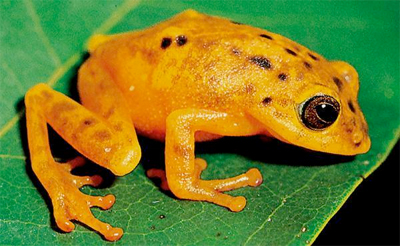A dozen previously unknown species of frogs have been discovered in the forests of Western Ghats according to a paper published in latest issue of Zoological Journal of Linnean Society, London.
The 12 species have been identified following a revision of the Philautus genus and are the result of ten years of field study in Kerala, Tamil Nadu, Karnataka. Goa, Maharashtra, and part of Gujarat, in the Western Ghats. The Western Ghats are considered a global biodiversity hotspot for their species richness and the threats the mountain range faces.
The finds include a rediscovery of a ‘lost species’, the Travancore bushfrog (Philautus travancoricus) which was thought to be extinct. The new discoveries bring the number of new species described by Delhi University herpetologist S D Biju and colleagues to 25 since 2003. The discoveries include the famed “purple frog” (Nasikabatrachus sahyadrensis) belonging to a new family of frog, Nasikabatrachidae; the dimmunitive Nyctibatrachus minimus, the smallest herp in India; and the first Indian canopy frog, Philautus nerostagona, among others.

Philautus akroparallagi. Photo copyright S D Biju, (frogindia.org) |
While the discoveries are exciting for the researchers in the amphibian community, Biju warns that the surveys reveal threats to frogs, namely habitat loss to urbanization and plantations.
“Seven of the 12 new species were only found in unprotected areas,” stated a news release from Delhi University. “Habitats are rapidly disappearing and immediate steps are required to protect the remaining forests from human activities.”
Amphibians are one of the most threatened groups of animals. Frogs, salamanders, and caecilians are declining worldwide due to habitat loss, over-collection as food and for the pet trade, the outbreak of a deadly fungal disease, pollution and pesticides, introduced species, and the effects of climate change. Some of these forces are interacting synergistically to further increase their vulnerability to extinction. Since 1980 more than 200 species are believed to have gone extinct.







